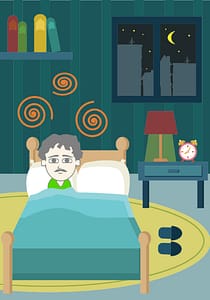[grwebform url=”https://app.getresponse.com/view_webform_v2.js?u=wfNAY&webforms_id=57753701″ css=”on” center=”off” center_margin=”200″/]
The Main Causes of Insomnia
The main causes of insomnia are important to understand. Insomnia is a condition characterized by difficulty sleeping despite adequate opportunity and circumstances for rest. There are numerous factors that can contribute to this disorder. They include biological changes in the body, psychological, behavioral, physical and environmental factors.
Biological changes
 One of the main causes of insomnia is biological changes in the body. For example, as we age, our circadian rhythms naturally become disrupted and our sleep patterns become less regulated and more fragmented. The human body has an internal clock that controls many of its functions, such as when we feel awake or sleepy. This clock is known as the circadian rhythm, and it is regulated by a hormone called melatonin. As we age, the production of melatonin decreases, which can lead to disruptions in our circadian rhythms. This can cause insomnia, as well as increased fatigue during the day.
One of the main causes of insomnia is biological changes in the body. For example, as we age, our circadian rhythms naturally become disrupted and our sleep patterns become less regulated and more fragmented. The human body has an internal clock that controls many of its functions, such as when we feel awake or sleepy. This clock is known as the circadian rhythm, and it is regulated by a hormone called melatonin. As we age, the production of melatonin decreases, which can lead to disruptions in our circadian rhythms. This can cause insomnia, as well as increased fatigue during the day.
Circadian Rhythm
If you’re one of the millions of people who experience circadian rhythm disorders, also known as circadian syndromes, you know how difficult it can be to get a good night’s sleep. These disorders can cause insomnia, daytime sleepiness, and other problems.
There are many possible treatments for circadian rhythm disorders. Some people find that making lifestyle changes, such as avoiding caffeine and getting regular exercise, helps. Others may need medication to help them sleep.
If you’re struggling with a circadian rhythm disorder, talk to your doctor about what treatment options might be right for you. With the right treatment, you can get the restful sleep you need to feel your best.
How to Offset Bio Challenges
There are several ways to help offset these effects. Try avoiding bright lights and technology in the evening and getting regular exercise. However, ultimately, the best way to protect our circadian rhythms is to get a good night’s sleep. Maintain a consistent sleep schedule and creating a soothing bedtime routine. That way youcan help keep our bodies on track and minimize the disruptions that come with aging.
Other biological changes that can impact sleep are pregnancy and menopause. Hormonal fluctuations during these times can disrupt key components of a healthy sleep cycle. Half of pregnant women suffer from insomnia, which can also lead to detrimental effects on the unborn baby. During pregnancy, the increased levels of estrogen and progesterone often lead to difficulty falling and staying asleep. Menopause typically results in hot flashes, night sweats, and other symptoms that can cause further disruptions. These issues can persist even after delivery or beyond menopause itself. They leave many women struggling to maintain a steady sleep schedule.
Psychological factors
Stress and anxiety are two of the most common causes of insomnia. When we experience high levels of stress or anxiety, our bodies enter into a state of fight or flight, which can disrupt normal sleep patterns. Over time, chronic stress and anxiety can lead to more serious mental health conditions. One example is depression, which can lead to chronic insomnia. In fact, 75% of people with depression also suffer from insomnia. Depression can lead to insomnia or make the other condition worse, and vice versa . Additionally, persistent worries about not being able to fall asleep or stay asleep can compound these psychological issues. Thus creating a vicious cycle of sleepless nights.
Strategies to Overcome the Psyche
There are a variety of strategies to help manage stress and anxiety and minimize their disruptive effects on sleep. These may include practicing mindfulness and relaxation techniques. It may include engaging in regular physical activity to improve mood, and sleep. It also could include seeing a therapist for cognitive behavioral therapy. By employing these strategies, we can better cope with the negative effects of mental health conditions like stress and anxiety. They can ultimately lead to more restful nights and a greater overall quality of sleep.
Behavioral Causes
For many people, a lack of exercise is the primary cause of insomnia. In fact, being active when you are younger and sleeping just fine is helpful for than rest. It is a way of preventing or delaying the onset of dementia as you .
Working the night shift can be a difficult and disruptive experience, especially if you suffer from insomnia. Many studies have shown that working at night can disrupt our natural sleep-wake cycle, leading to irregular sleeping habits and serious sleep disorders. This is primarily due to a lack of exposure to natural light, which causes our circadian rhythms to become disrupted and out of sync with external time cues.
Additionally, working night shifts tends to involve increased levels of stress (see our article on Stress and Anxiety). that can also interfere with normal sleeping patterns. Ultimately, this combination of factors means that those who work night shifts are more likely to experience insomnia. Therefore it is essential to create a healthy sleep routine if you work overnight shifts. By taking steps like creating a calming bed-time routine, you can improve your chances of getting a good night’s (day’s) sleep. This works even if your schedule requires you to work unconventional hours.
Body Clock Issues
Due to the disruption of the body clock, not having a regular bed time can also lead to insomnia. Going to bed much later some nights and having a lie-in some mornings affects melatonin, the sleep hormone. This can have the same effect as jet lag.

Physical Causes
Some of the most common physical conditions that might cause insomnia include medical issues. Chronic pain, sleep disorders like restless leg syndrome, and sleep apnoea, medication side effects and hormonal imbalances are examples.
Restless Leg Syndrome
If you’ve ever had an uncontrollable urge to move your legs, especially when you’re trying to sleep, you may be familiar with the feeling of restless leg syndrome (RLS). This condition is characterized by an irresistible urge to move your legs, often accompanied by uncomfortable sensations like tingling, burning, or itching. While the exact cause of RLS is unknown, it’s thought to be linked to an imbalance of the brain chemical dopamine.
RLS can make it difficult to get a good night’s sleep, which can lead to daytime fatigue and other problems. If you think you may have RLS, talk to your doctor. There are treatments that can help relieve symptoms and improve sleep quality.
Environmental Factors
Lastly, environmental factors can cause insomnia. For example, people who live in urban areas may be exposed to bursts of artificial light that disrupt their circadian rhythms. Likewise, those who overheat at night due to high temperatures, such as during the summer, might find it challenging to fall and stay asleep. On the other hand, insomnia can often be worse during the winter. This is because, despite cold temperatures outside, the home is centrally heated. Often the thermostat is set way above the favorable temperature for a good night’s sleep.

Sleep on It !
Insomnia can have many different causes, including stress, anxiety, medication side effects, and health problems. Poor sleep habits, such as watching television or using electronic devices in bed, can also contribute to insomnia. By addressing the many potential causes of insomnia and making both behavior and lifestyle modifications, it is possible to overcome insomnia.
For a deep dive into insomnia treatment, click on and read this article from the Mayo Clinic: “Insomnia treatment: Cognitive behavioral therapy instead of sleeping pills.”
[grwebform url=”https://app.getresponse.com/view_webform_v2.js?u=wfNAY&webforms_id=57753701″ css=”on” center=”off” center_margin=”200″/]


